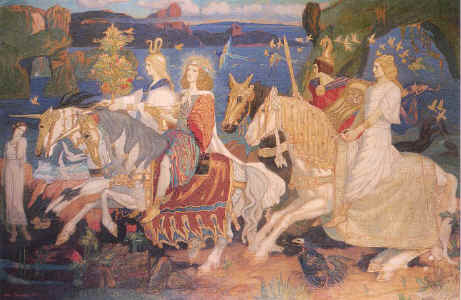
A common Celtic view of the initiatory journey into the spirit world is an abduction by faeries, who may also be called the “gentry”, “the good people”, or the “the people of the sidhe” (the older gods and goddesses who dwell in the hollow hills).
To be “taken” into Faeryland, or into the sidhe, can occur in several ways. Sometimes a person stumbles into Faerie by making a wrong turn on a well-known path or, as the Irish say, stepping upon a “stray sod”. In older myths and more recent folktales, a person is lured into the realms of the Otherworld by a faery man or woman, or by a faery animal, often snow white* or colorless. A variation on this more active entry is to fall into a deep sleep or be lulled asleep by faery music or the singing of magical birds. Accounts of faery abductions indicate that the person “awoke” to discover himself or herself in the faery kingdom.
- "Fire in the Head", by Tom Cowan, p. 14-15
In the course of adventures there is plenty of room for faeries, though most RPGer's I know don't really delve there very much. Yet fairytales and folklore can form the basis for an amazing variety of great game stories. One might consider that faeries belong in the same world as goblins and giants. Yet the Fey get short shrift mostly, and I suppose that's a bit unfair, considering that the fey really do form a great link in the chain of fantasy.
In particular fairytales embody perfect game material for children, even those as old as 11, and especially for little girls, who seem to love faeries even more than the rest of us. Perhaps the faeryworld, after all, is the wellspring of fantasy. I tend to think that at least George MacDonald and C.S. Lewis might agree, though I wonder about Tolkien. His world was more somber than the feylandia of Narnia, as I think it drew more heavily from Norse Mythology than Lewis, or MacDonald. And so Tolkien's elves were made of sterner stuff than what we get from the Celtic Fairytales, or at least those that I've encountered so far.
At any rate, I am interested in exploring the feylandia further for my own game. I took a wonderful little sojourn there 2004 with the Hamfest Hellhounds. What a trip that was! You can find some of the story chapters on the LRPGSW site under Files > Elthos Chapters > 2004 Spring Season Chapters (you must join the group to get access to the file, but that's very easy to do). Well, that's the thought for the moment. I hope it encourages and inspires further consideration of the fey as a source for story.
As for the Shamanistic aspect of Feylandia, I think it very interesting that one of the varieties of Shamanistic inductions is related directly to the fey. Interesting indeed. Further thoughts on this later as I look into this further. Excellent book so far, by the way... "Fire in the Head". So was "Gods and Myths of the Viking Age" by Davidson. Very good.
* - Wondering if there is some thread here leading from Snow White and the Seven Dwarves to the Sidhe? It almost seems...
As a bonus, here is Fairytale from the old world. I find it fascinating... though does not on the surface seem to make very much sense at all, and seem almost absurd in its simplicity, when one considers Shamanism and the journey to the Otherworld, perhaps it may take on more meaning...
Fitcher's Bird from Grimm's Fairy Tales
At the very least it gives us an old world view of such matters, and these too can be fodder for excellent RPG campaigns.
2 comments:
If you delve deep enough into Folklore you'll find that many of the later faery tales were mild retellings of much darker lore. Faeries may have been towards the end softer in some ways than Tolkien's elves, but the Tuatha De Danna who "became" the Aes Sidhe (People of the Hills) and later just sidhe (hill) were far more godlike, and powerful.
As to the later stories I'm not sure of the aspect of initiation into any sort of mysticism--the stories usually fall along the same lines of the quick witted mortal outwitting the supernatural--this is much the same as the story of Orpheus who escaped Hades, and other similar "mortals vs supernatural" oneupman stories that show why humans prevail against the elements/challenges of the world.
"Historically, epic poetry and cultural mythology may have originated in the visionary work of a people's shamans. In his vast study of comparative religion, Mircea Eliade speculates that the material that becomes a culture's mythology is derived in part from the journeys of historical shamans into the Otherworld."
- Fire in the Head, by Tom Cowan, p. 25
Post a Comment